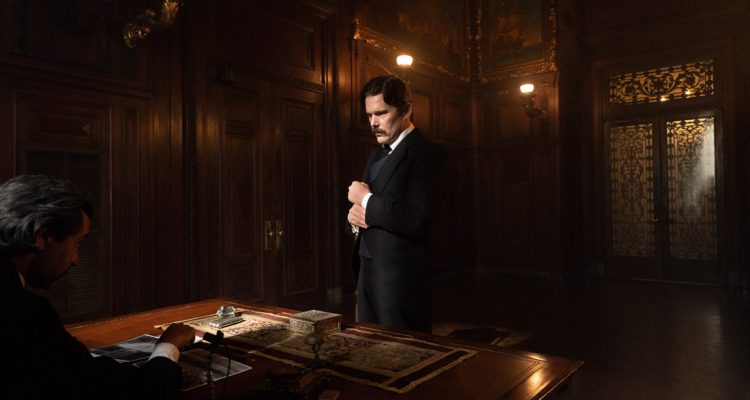“No sparks,” says a taciturn Nikola Tesla (Ethan Hawke), showing the prototype of his revolutionary induction motor to potential investors. “No sparks?” they harrumph through mutton-chop whiskers in wood-paneled rooms. Then when he flicks the brassy switch on his invention and – pardon the engineering jargon – the doodad spins amid tightly coiled copper gizmos, producing none of the mini-lightning bolts or fizzing static they expect, they say again this time with breathless awe: “No sparks!”
But that which was a source of wonder in the candlelit New York City parlors of late 19th century is a drawback in the cinema of the early 21st. Michael Almereyda‘s “Tesla” tries very hard to generate its own electricity, using jaunty technological anachronisms, slide projections, flights of wholly invented fancy, self-aware voiceover, and a fourth wall so thoroughly torn down David Hasselhoff should be rocking out on top of its ruins. Still, somehow: no sparks.
READ MORE: Here Were Our Most Anticipated Films at the 2020 Sundance Film Festival
The critical issue may very well be the writer-director’s conception of Tesla himself. After all, Almereyda used similar self-conscious artifice to far more engaging effect in his 2015 Stanley Millgram movie, “Experimenter,” so the problem is not with the approach. Indeed, the po-mo deconstructivist “Tesla” almost seems on paper like the film that all five people who saw “The Current War” might have wished into being as an alternative: an irreverent, inventive take on an irreverent, inventive man.
But when your eponymous genius character is stodgily portrayed as a humorless, unresponsive, resentful loner, your film will feel inert. Even when played by as naturally sympathetic an actor as Almereyda’s regular collaborator Hawke, and even when surrounded by a game, often inspired cast bouncing around on roller skates, unexpectedly whipping out iPhones and Macbooks, and bopping ice cream cones off each other’s noses.
READ MORE: 100 Most Anticipated Films Of 2020
First, there’s a cute prologue in which Tesla and Anne Morgan (Eve Hewson), daughter of banker JP, skitter unsteadily around a conservatory on skates, set to the rather distractingly unmistakable strains of Wojciech Kilar‘s score from “The Portrait of a Lady.” Then we meet Tesla properly and he has been working for the mercurial, egomaniacal, unbearable Thomas Edison for a short time already after his arrival in the US – Edison is played by Kyle MacLachlan, having an infectiously good time and given all of the film’s best jokes (including at least two direct nods to the “Twin Peaks” universe).
The unworldy, unyielding Tesla is disillusioned and chafing under Edison’s tyranny, leaves his employ, and, after a short spell as a manual laborer, finds backers to fund his own fledgling company. But the specter of destitution always hovers, and soon Tesla will need new benefactors, whom he finds in the forbidding JP Morgan (Donnie Keshawarz), and the jollier, heartier George Westinghouse (a lovely turn from Jim Gaffigan).
READ MORE: The 25 Best Movies Of 2020 We’ve Already Seen
Such are the loose beats of Almereyda’s “Tesla,” along with the execution by electrocution that proved so ruinous to Edison’s rival Direct Current and the Worlds Fair which was such a triumph for Westinghouse/Tesla. But Almereyda knows knows that the wikipage highlights are not enough to raise the film above the level of nicely-rendered book report. So he contrives to have the story meta-narrated by Hewson’s Anne, whose pleasantly arch voiceover is replete with statistics about Google searches, future achievements and which bits of what we see “really happened,” often delivered, schoolmarm-style in front of a screen displaying projected images.
This technique adds in terms of interest, not only thematically but visually, as Sean Price Williams’ cinematography gets to encompass both extremes: the stately interiors of mansions, libraries, and workshops filled with Tesla’s steampunky contraptions; and the dreamlike sequences with Anne recounting parts of Tesla’s backstory, or his reminiscences about his brother, who died young but was, he claims, the real genius of the family. These cursory attempts to give Tesla some dimension get lost in the muddle, as do many of his more outré pronouncements about nature being like a cat stroked by a mysterious hand and so on. Unmoored to a deeper understanding of the man behind the recently resurrected, semi-mystical Tesla myth, they serve more to obscure Tesla than to reveal him.
There are a few moments when this tricksy, surface-level film connects emotionally such as when Westinghouse offers Tesla the chance to sign a contract that would be advantageous for the inventor but would force Westinghouse himself out, and Tesla tears it up in an unusual display of bromantic loyalty. But these instances of vitality are a lot due to the colorful overtime put in by the characters in orbit around Tesla’s blockish impenetrability, and often the liveliness they project doesn’t have anywhere to go. There’s the underwritten relationship with his assistant Szigeti (a delightfully warm and real Ebon Moss-Bachrach); an apparent romantic dalliance with famous actress Sarah Bernhardt (a slinky Rebecca Dayan) which surely could have made them the Kimye of their day; not to mention the wryly lovesick, off-kilter Anne, beautiful and unbelievably loaded, patiently waiting for this starchy Serb to look her way. The supporting cast, fine craft, and the appealingly idiosyncratic approach to history, legacy, and storytelling summon as much energy as they can and fling it Tesla’s way, but whatever he’s made of in Almereyda’s film, it’s a perfect insulator and generates no sparks. [B-/C+]
Follow along for all of our coverage from the 2020 Sundance Film Festival here.

